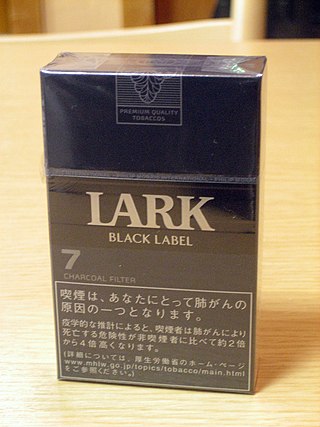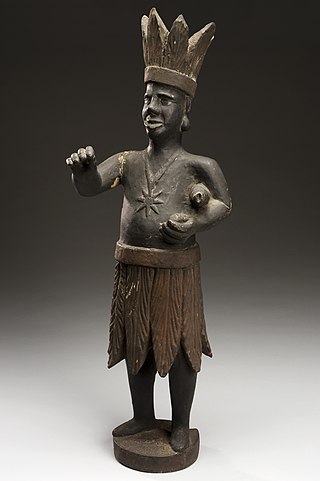
Smoking cessation, usually called quitting smoking or stopping smoking, is the process of discontinuing tobacco smoking. Tobacco smoke contains nicotine, which is addictive and can cause dependence. As a result, nicotine withdrawal often makes the process of quitting difficult.

The Marlboro Man is a figure that was used in tobacco advertising campaigns for Marlboro cigarettes. In the United States, where the campaign originated, it was used from 1954 to 1999. The Marlboro Man was first conceived by Leo Burnett in 1954. The images initially featured rugged men portrayed in a variety of roles but later primarily featured a rugged cowboy or cowboys in picturesque wild terrain. The ads were originally conceived as a way to popularize filtered cigarettes, which at the time were considered feminine.

World No Tobacco Day (WNTD) is observed around the world every year on 31 May. The annual observance informs the public on the dangers of using tobacco, the business practices of tobacco companies, what the World Health Organization (WHO) is doing to fight against the use of tobacco, and what people around the world can do to claim their right to health and healthy living and to protect future generations.

Silk Cut is a British brand of cigarettes, currently owned and manufactured by Gallaher Group, a division of Japan Tobacco. The packaging is characterised by a distinctive stark white packet with the brand name in a purple, blue, red, silver, white or green square.

Nicotine marketing is the marketing of nicotine-containing products or use. Traditionally, the tobacco industry markets cigarette smoking, but it is increasingly marketing other products, such as electronic cigarettes and heated tobacco products. Products are marketed through social media, stealth marketing, mass media, and sponsorship. Expenditures on nicotine marketing are in the tens of billions a year; in the US alone, spending was over US$1 million per hour in 2016; in 2003, per-capita marketing spending was $290 per adult smoker, or $45 per inhabitant. Nicotine marketing is increasingly regulated; some forms of nicotine advertising are banned in many countries. The World Health Organization recommends a complete tobacco advertising ban.
Action on Smoking and Health (ASH) is the name of a number of autonomous pressure groups (charities) in the anglosphere that seek to publicize the risks associated with tobacco smoking and campaign for greater restrictions on use and on cigarette and tobacco sales.

WPTA is a television station in Fort Wayne, Indiana, United States, affiliated with ABC, NBC, and MyNetworkTV. It is owned by Gray Television alongside CW+ affiliate WISE-TV. The two stations share studios on Butler Road in Northwest Fort Wayne, where WPTA's transmitter is also located.
Truth is an American public-relations campaign aimed at reducing teen smoking in the United States. It is conducted by the Truth Initiative and funded primarily by money obtained from the tobacco industry under the terms of the 1998 Master Settlement Agreement reached between 46 U.S. states and the four largest companies in the tobacco industry.
Winston is an American brand of cigarettes, currently owned and manufactured by ITG Brands, subsidiary of Imperial Tobacco in the United States and by Japan Tobacco outside the U.S. The brand is named after the town where R. J. Reynolds started his business which is Winston-Salem, North Carolina. As of 2017, Winston has the seventh-highest U.S. market share of all cigarette brands, according to the Centers for Disease Control and Prevention and the Maxwell Report.

Lark is an American brand of cigarettes, owned by Altria Group, and manufactured by Philip Morris USA in the United States and Philip Morris International for the rest of the world.

Tobacco has a long history in the United States.
The Massachusetts Tobacco Cessation and Prevention Program (MTCP) is an anti-tobacco program run by the Massachusetts Department of Public Health with the goal of decreasing tobacco prevalence in the state of Massachusetts. MTCP has four main components: preventing youth smoking, protecting against second hand smoke, assisting current smokers with quitting, and eliminating tobacco related disparities. Since the program began in, adult smoking rates have declined from 22.6% in 1993 to 16.1% in 2008, allowing Massachusetts the 4th lowest smoking rates in the country.

Smoking in Iceland is banned in restaurants, cafés, bars and night clubs as of June 2007. A large majority of Icelanders approve of the ban. At the time the ban went into effect, almost one in four Icelandic people were smokers.
Tobacco Free Florida is an anti-smoking organization based in the U.S. state of Florida, administered by the Florida Department of Health.

Truth Initiative is a nonprofit tobacco control organization "dedicated to achieving a culture where all youth and young adults reject tobacco". It was established in March 1999 as a result of the Tobacco Master Settlement Agreement between the attorneys general of 46 states, the District of Columbia and five United States territories, and the tobacco industry. Truth Initiative is best known for its youth smoking prevention campaign. Its other primary aims include conducting tobacco control research and policy studies, organizing community and youth engagement programs and developing digital cessation and prevention products, including through revenue-generating models. The organization changed its name from the American Legacy Foundation to Truth Initiative on September 8, 2015, to align its name with that of its Truth campaign. As of 2016, the organization had more than $957 million in assets and a staff of 133 based primarily in its Washington, D.C., office.
"Tobacco" is a segment of the HBO news satire television series Last Week Tonight with John Oliver about the tobacco industry. It first aired on February 15, 2015, as part of the second episode of the series' second season. During the eighteen-minute segment, comedian John Oliver discusses tobacco industry trends and practices.

Tobacco smoking is popular in North Korea and culturally acceptable among men, but not for women. As of 2014, some 45% of men are reported to smoke daily, whilst in contrast only 2.5% of women smoke daily, with most of these being older women from rural areas. Smoking is a leading cause of death in North Korea, and as of 2010 mortality figures indicate that 34% of men and 22% of women die due to smoking-related causes, the highest mortality figures in the world. There are tobacco control programs in North Korea, and although smoking was not prohibited in all public spaces, the smoking rates have declined since their peak in the 2000s.

As nicotine is highly addictive, marketing nicotine-containing products is regulated in most jurisdictions. Regulations include bans and regulation of certain types of advertising, and requirements for counter-advertising of facts generally not included in ads. Regulation is circumvented using less-regulated media, such as Facebook, less-regulated nicotine delivery products, such as e-cigarettes, and less-regulated ad types, such as industry ads which claim to discourage nicotine addiction but seem, according to independent studies, to promote teen nicotine use.

The history of nicotine marketing stretches back centuries. Nicotine marketing has continually developed new techniques in response to historical circumstances, societal and technological change, and regulation. Counter marketing has also changed, in both message and commonness, over the decades, often in response to pro-nicotine marketing.
Smoking in Australia is restricted in enclosed public places, workplaces, in areas of public transport and near underage events, except new laws in New South Wales that ban smoking within ten metres of children's play spaces.











